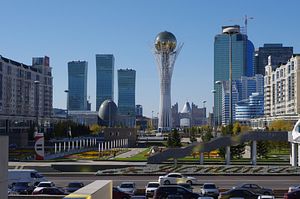A fifth round of talks on Syria passed this week in Astana, drawing representatives from Russia, Iran, and Turkey back to Kazakhstan for more discussions about establishing de-escalation zones in Syria.
In early May, at the fourth round of talks, representatives from Moscow, Tehran, and Ankara agreed to set up four so-called de-escalation zones within which there would be a halting of hostilities between rebel groups and Bashar al-Assad’s forces. Neither the Syrian government nor rebel groups signed on to the plan.
Moscow’s chief negotiator, Aleksandr Lavrentyev, said a basic framework had been “essentially agreed” to in the latest talks, but details about the specific zones and participating forces still “need finalizing.” Ultimately, there was no agreement at the end of the talks.
In late June, Russian and Turkish officials had floated the idea of Kazakh or Kyrgyz troops deploying to monitor the zones. Both Bishkek and Astana walked the suggestion back, with Kazakhstan saying no such discussions were taking place and the Kyrgyz claiming the idea had been lofted within the Collective Security Treaty Organization (CSTO) but hadn’t been formally discussed.
Lavrentyev mentioned after the talks that Russia was asking members of the Commonwealth of Independent States (CIS) to consider providing “military observers” to monitor the de-escalation zones. Syrian opposition groups are strongly opposed to Iranian military observers, with one opposition representative quoted by Interfax as saying “The entire opposition does not agree to the Iranian forces’ presence.” At the same time, Russia’s strong backing of the Assad regime makes Moscow’s forces also not quite right for the job. Whether the nine states of the CIS — a loose association of former Soviet states — are removed enough, politically, from Moscow to be more palatable is yet to be seen.
Kazakh Foreign Minister Kairat Abdrakhmanov said representatives from Russia, Turkey, and Iran would meet in the Iranian capital August 1-2 to hammer out the remaining disagreements on the de-escalation zones, followed by a sixth round of talks in Astana at the end of August.
While the Astana process is separate from the UN’s Geneva talks, the attendance of the UN Special Envoy for Syria Staffan de Mistura links the Kazakh platform to broader international efforts. Mistura conveyed the UN’s appreciation for “the persistence, the determination, the constant hard work of the Astana Guarantors and all the countries who are being involved in this effort of de-escalation of violence and the strengthening of the ceasefire in Syria.”
He noted that the UN had tried thrice in three years to establish a ceasefire in Syria, to no avail; nevertheless, “Astana is particularly meant for producing a ceasefire, what they call a de-escalation, and that is why we believe that Astana does deserve patience and support, and there is more energy and time required — and we are with them in trying to make sure this will happen.”
He described the Astana and Geneva talks as “complementary and mutually supportive action[s].” The Astana talks aimed at a ceasefire, an important interim solution but unsustainable without the kind of political settlement the Geneva talks are aimed at establishing.
One other attendee worth noting is United States Acting Assistant Secretary of State for Near East Affairs Stuart Jones. Jones was mentioned by Interfax as meeting with Syrian opposition representatives. Jones also attended the May talks, but did not participate. The United States remains an observer when it comes to the discussions in Astana.
The Astana talks may be going nowhere, but that doesn’t mean there’s nothing to celebrate. One of President Nursultan Nazarbayev’s assistants (with the title “presidential aide for international affairs”) Nurlan Onzhanov, authored a book on Nazarbayev’s efforts to reach peace in Syria and his vital role in settling tensions between Turkey and Russia last year. Peacemaker: The Syrian Knot, with Nazarbayev’s smiling visage on the cover, may be a little premature.

































